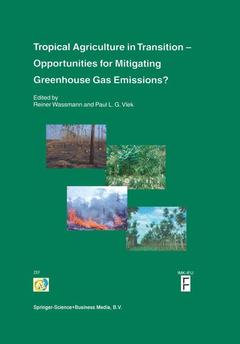Description
Tropical Agriculture in Transition — Opportunities for Mitigating Greenhouse Gas Emissions?, Softcover reprint of the original 1st ed. 2004
Coordinators: Wassmann Reiner, Vlek Paul L.G.
Language: English
Subjects for Tropical Agriculture in Transition — Opportunities for...:
Publication date: 12-2010
277 p. · 17x24.4 cm · Paperback
Publication date: 11-2003
277 p. · 15.5x23.5 cm · Hardback
Description
/li>Contents
/li>
Production from tropical agricultural systems will need to increase to satisfy the rising food demand of an increasing population coupled with changes in consumption patterns. At the same time, the agricultural sector is a significant source of greenhouse gases (GHG) in many developing countries, which can be attributed mainly to land-use change and methane emissions from rice and livestock. But how can we reconcile less GHG emissions from tropical agricultural systems while increasing productivity?
Due to the interactive nature of these issues, this book is compiled of articles on natural resource management, as well as the socio-economic aspects of GHG mitigation. The scope of mitigation options in tropical agriculture is discussed for three different activities: (a) agroforestry; (b) rice-based production systems; (c) pasture/animal husbandry.
Agronomic solutions alone will not be sufficient, as the institutional and economic frameworks within which farmers operate dictate whether a recommended agronomic management practice is acceptable. The prevention of deforestation, and the re-forestation of degraded land, could become key elements to national climate protection programs of some developing countries. Alternative management practices in rice-based and pasture systems may offer win-win options to reduce emissions and improve resource-use efficiencies.




